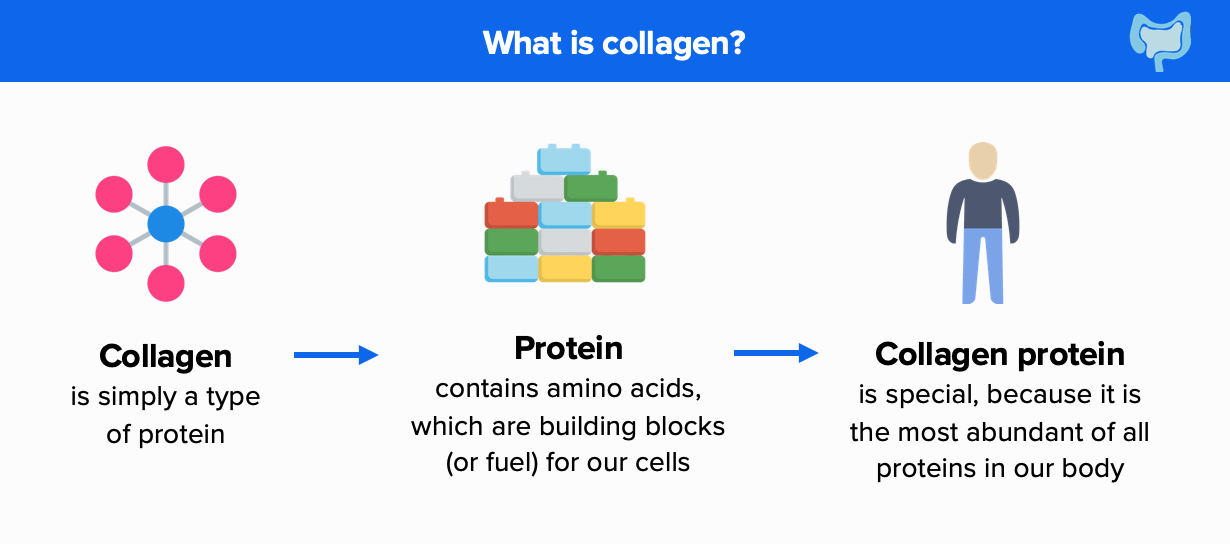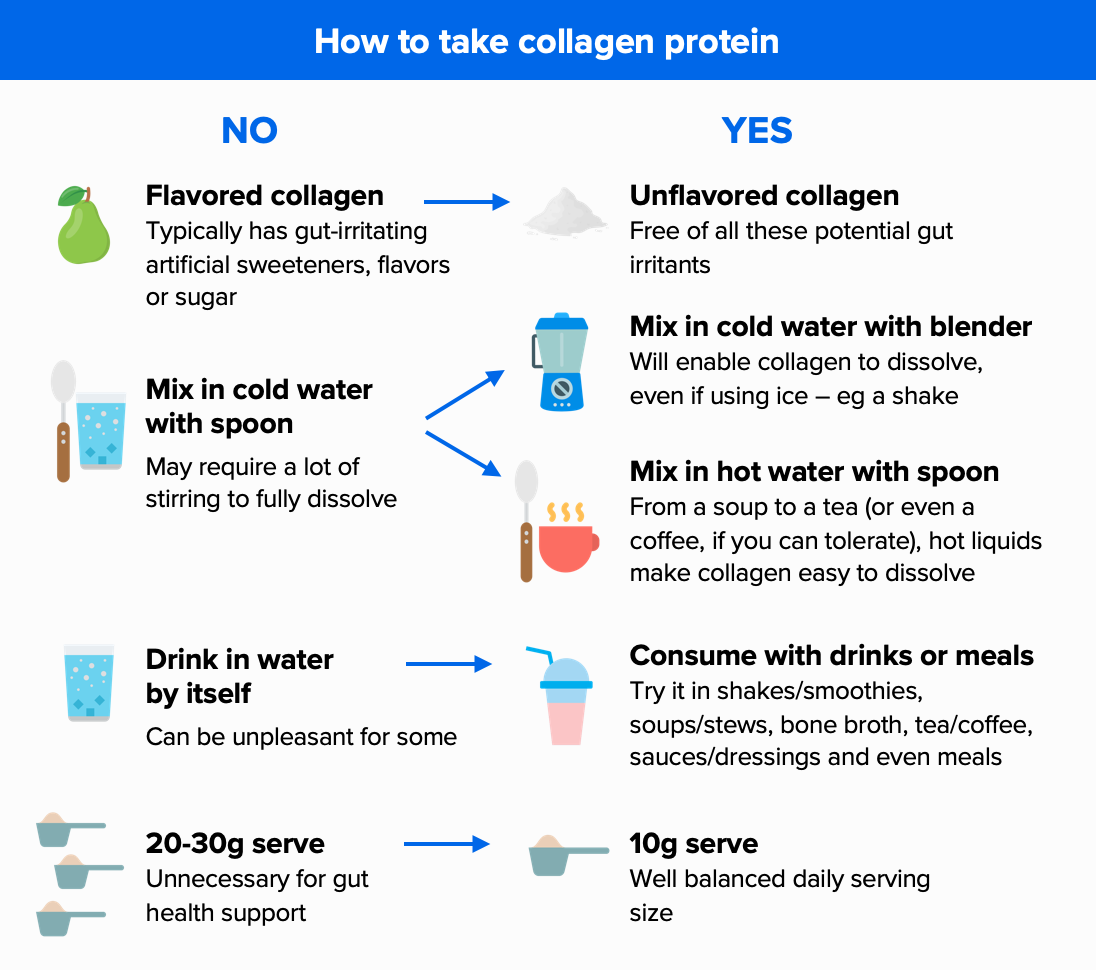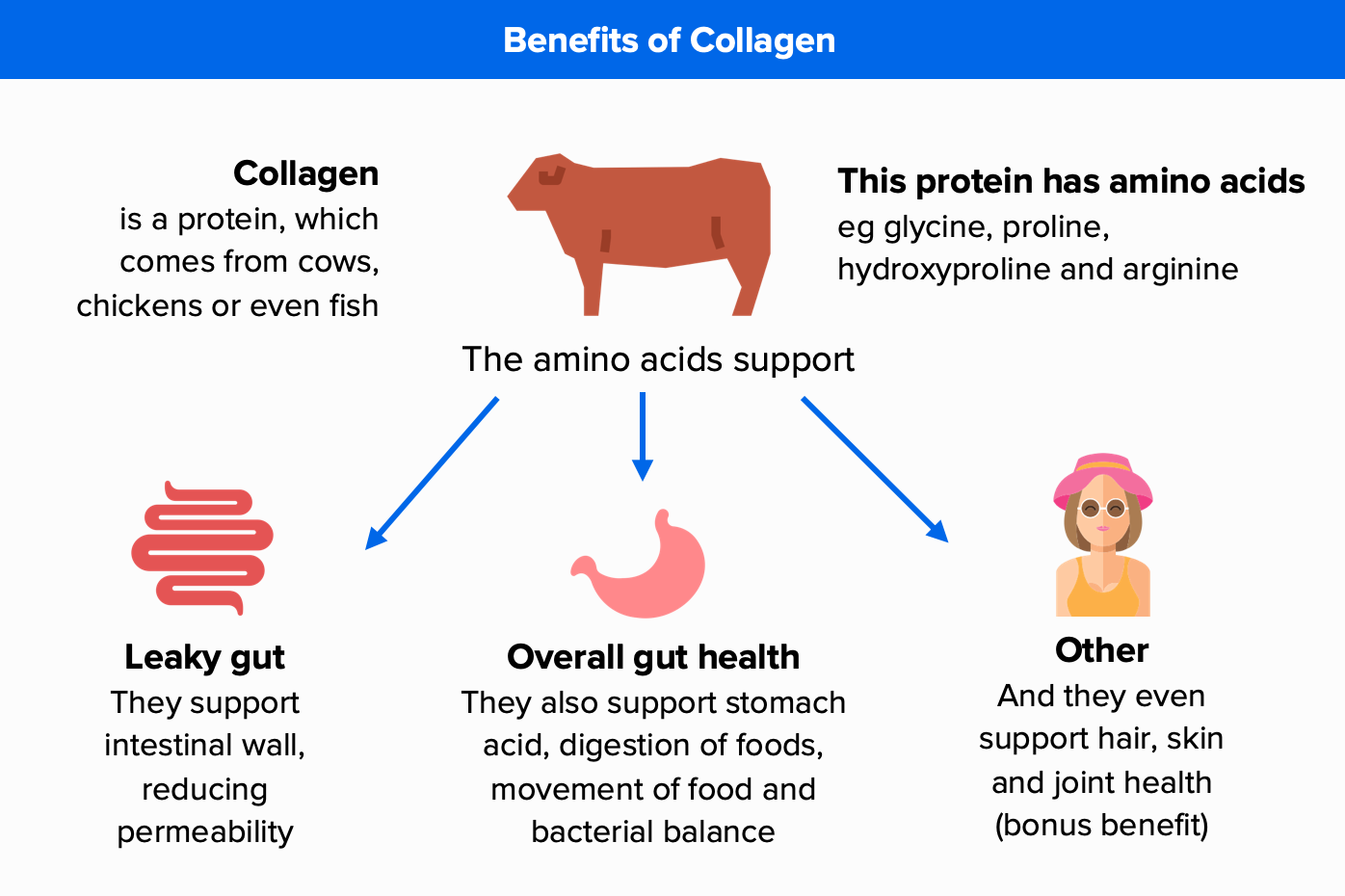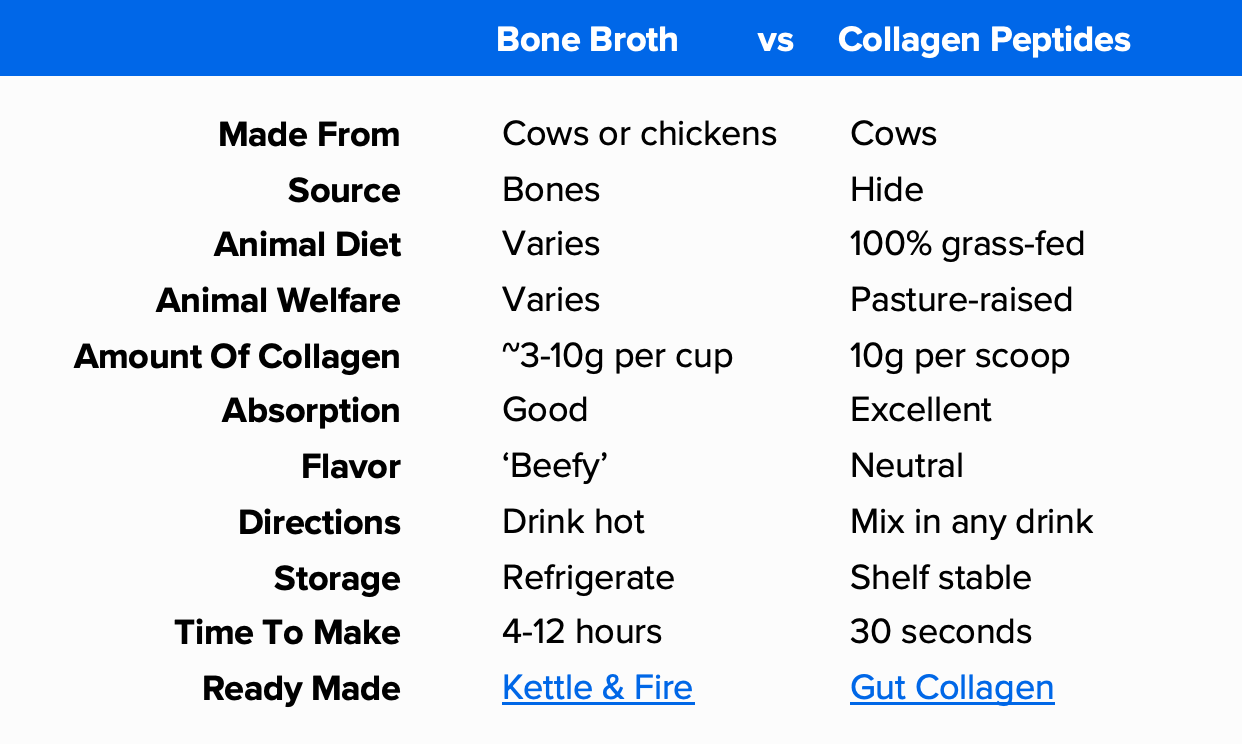Can collagen – a type of protein – help support against leaky gut? And if so, how does it work and how can we get more through nutrition? We’ll look at all of this and more in this ultimate guide to collagen and leaky gut!
Last Updated: Nov 12, 2023

In this guide, you’ll discover…
Captain America. Batman. Superman. Yeah, they’re alright. But you know what?
For those of us experiencing leaky gut, collagen is the real superhero we need.
In fact, it is one of my absolute favorite ingredients for better gut health – a true game changer!
And given how much the Western diet is devoid of collagen these days, the benefits we can experience once we start taking it again, can be felt in just a matter of days (not weeks).
But before we look at how collagen helps leaky gut, I think it’s worth quickly explaining what it actually is.
Because I’m sure you’ve seen people talking about ‘collagen’ everywhere from podcasts to health websites and even on Instagram. And I know it can all start sounding a bit complicated.
Let’s dive in.
So first of all, what is collagen?
Before we can understand the importance of collagen for our intestinal health, we need to take a moment to realize that our intestinal tract or gut if you like, is just like our muscles.
Which means in order to grow strong, it too needs to be fed protein.
But the difference of course is what type of protein. And that’s where collagen comes into play.

You see, collagen is simply a type of protein1.
But most importantly, collagen is arguably the king of proteins because it is the MOST abundant of all the proteins in our body2, making up a staggering 30% of all protein in us3.
Pretty cool, right!
Well, collagen is packed with huge servings of the types of amino acids our GI tract (gut wall) feeds on in order to repair itself4 – eg glycine, proline, hydroxyproline5 and arginine6, which are building blocks for our cells7.
In other words, the amino acids in collagen can feed our cells the nutrients they need to grow and repair8.
These amino acids work great together to mend the damaged cells lining the wall of our gut and restore the integrity of the intestinal lining9,10.
i.e. reduce permeability or ‘leakiness’ in our gut barrier.
Collagen has also shown to strengthen the gut by providing more resistance to elastic stretch11. This resistance is important, as excessive stretching can gradually wear out tight junctions12 and cause intestinal cells to misalign or sit further apart13, eventually leading to a gut that is ‘leaky’.
Taken together, we can start to see just how well this super-nutrient works to reduce permeability or ‘leakiness’ in our gut barrier – by providing the necessary building blocks while also helping cells to align properly14 and strengthening the tight junctions15,16 of the gut lining17.
Adios leaky gut!
4 other ways collagen can help our gut health
The fascinating blend of amino acids in collagen can also help to:
- Regulate stomach acid levels – thanks to the presence of glycine18. And this is really cool, because this in turn helps break down the protein-rich foods we eat like meat, fish, eggs etc. Plus, it also helps protect the gastric mucosa19,20.
- Help further digest our food – as collagen can help maintain the integrity of the gut lining21.
- Encourage food to move through the GI tract – hello beautiful bowel movements!22
- Improve bacterial balance by providing a surface for helpful gut bacteria to attach to23,24,25, while also encouraging the growth of good bacteria, such as bifidobacteria, in the gut.
It really is a remarkable protein!
My favorite bonus benefit of collagen & why I keep taking it every single day – look great, feel great!
You see, in addition to gut health, collagen can also help support our skin, hair and joints26, as well as weight management27.
Meaning it can help us look our best and feel it too!
In fact, it is THIS benefit that has seen collagen become the most talked about ingredient in the health and wellness industry. Not a bad bonus benefit.
And you can see why so many people now look at it almost as THE ‘multivitamin’ for the gut.
Unfortunately, for many of us, our collagen levels are low.
This is actually not so surprising, since our bodies produce less collagen as we age28,29.
And perhaps even less surprising when we realize that as we move past roughly 40 years old, collagen depletes faster than our body can produce it30.
In fact, collagen loss begins already between the ages of 18 and 2931 and these changes can make us susceptible to disruption of healthy body functions32,33.
So seeking out an external source of collagen, which can offer the nutrients to help with collagen retention and formation, can be a wise idea.
Bone broth!
It turns out collagen is the key ingredient in bone broth and what makes it so good for leaky gut.
And as I’m sure you know, bone broth is made by simmering the bones of animals, especially those from cows – ie beef bone broth.

I can definitely understand that to many of us it sounds rather off putting, but the end liquid (broth) contains huge servings of collagen, which our gut loves.
One of the foods most commonly touted for having a high collagen content is bone broth.
Unfortunately, bone broth has 4 problems – being taste, time, price & effectiveness
Some people say the beefy taste is too much, especially in the morning.
Others say they don’t have the time to always be simmering a big pot of broth.
While others mention the high price of prepackaged quality bone broth.
Possibly even more importantly, the amount of collagen in bone broth may not be enough for true gut support, with recent studies suggesting that collagen in supplement form may be more effective for promoting collagen synthesis due to higher concentrations of the amino acids that promote collagen synthesis34.
So while we may be able to obtain collagen from all-natural food sources, it is unfortunately not always as effective as we think, and can be quite inconvenient for most of us living busy lives.
Whilst there are many collagen-rich foods, like bone broth, the problem is the amount of collagen in them can be low on a percentage basis35 – making supplementation of pure collagen much easier, especially from an absorption point of view.
And so that’s why a flavorless collagen supplement can be worth trying.
Well, currently, there are 2 main types of collagen supplements on the market. You have collagen derived from cows, commonly known as bovine collagen, and collagen derived from fish, which is called marine collagen.
Marine versus bovine collagen – what’s best?
While marine collagen is largely packed with a high concentration of type 1 collagen36 and can thus be particularly helpful for supporting collagen levels in our hair, skin & joints37.
Bovine collagen comes with both type 1 and type 3 collagen.
And it is the type 3 that makes it more suitable for support along the gastrointestinal tract, since type 3 collagen is what is naturally found in the intestinal tract.
In fact, any lack of this type of collagen is likely to lead to fragile/weak intestines38, making it a priority supplement when it comes to gut health.
Bovine collagen is best for leaky gut
There are different types of collagen, eg type 1, type 2, type 3 etc. The types most suited to gut support are 1 and 3, since they are the types found in our GI tract. And of the various sources of collagen, eg marine, bovine etc, it is bovine that contains 1 and 3 in the largest amounts.
Which is unsurprising, since bovine collagen typically comes from the skin of a cow39.
Unfortunately, not all bovine collagen supplements are created equal
The biggest problem I see in the industry is that many companies source their collagen from low quality cattle that have been grain-fed40, and often with poor farming practices.
And many of them even source their collagen from China, where quality assurance standards around livestock can vary even further.
In addition, it is also disappointing to see that some products contain collagen that is derived from the bones or cartilage of the cows. Which is less than ideal, as I’ll explain in a minute.
And the other concerning issue with most collagen powders, is that many use artificial flavors or sugars, which can greatly reduce the net benefit of taking the powder in the first place (since these substances can actually be harmful for the gut41).
Just like with food, it is crucial to know where your collagen comes from
Just like we spend time picking quality foods to eat – usually grown right here in the USA – we should do the same when it comes to choosing our collagen supplements.
Unfortunately, many collagen peptides products are sourced from cows outside the USA, eg South America, China etc. Spending extra time to find USA-sourced collagen is key.
With all of this in mind, my research team and I decided to go on a search to find the highest quality and cleanest source of collagen that could address these problems once and for all.
Say hello to this Collagen.
It is a unique supplement because it is not only sourced from grass-fed cows, but the cows are also pasture raised right here in the USA (NOT China or South America), making it a healthy, ethical & sustainable source of collagen.
Just as importantly, the collagen is derived from the hide of these cows, not the bones or cartilage.
This is crucial, because the hide is the cleanest source of collagen, since it is constantly being regenerated throughout the animal’s life.
Collagen from the hide of cows is best
Unlike collagen sourced from bone or cartilage, collagen sourced from the hide is arguably the cleanest, since this part of the animal is constantly being regrown throughout its life.
While this collagen will deliver great support for our hair, skin and joints, it really comes into its own from a gut health point of view, as it delivers large servings of type 3 collagen which is ideal for intestinal support.
Best of all, this Collagen is hydrolyzed, which simply means the large protein molecules have already been broken down into their smaller peptide form.
Now that might sound a bit complicated, but it’s really important, because what it means is that the collagen is going to be more easily absorbed by our gut42.
Hydrolyzed collagen (aka collagen peptides) are the easiest form of collagen for our body to absorb
Because this type of collagen has already been pre-broken down – or pre-digested if you prefer – it means it comes in a form that our body can readily absorb and utilize43. i.e. higher concentrations can be taken up in the bloodstream44, therbey making it much more effective.
But perhaps what people love most, is that unlike collagen-rich foods such as bone broth and organ meat, this collagen has a non-meaty flavor, is easy to mix into hot and cold beverages, or even recipes, and it is easy to take at any time of day.
Collagen can be taken in drinks, soups or even added to recipes
Whilst collagen will stir really well into a cup of tea or simple glass of water, it can also be blended into shakes or soups, or even added into a meal. Making it super easy to enjoy in any circumstance.
A clean collagen supplement you can trust
Importantly this Collagen meets the highest purity standards, as not only is it independently 3rd party verified gluten, dairy and soy free, but it is also free of GMOs, nuts, fish, shellfish, eggs, corn, starch, yeast, artificial colors and flavors.
Perhaps even more importantly, since this is a bovine-based product, is that it is also hormone, antibiotic, BSE, TSE and MSG free.
With a smarter, cleaner and more gut-focused formula, I believe this is the best collagen supplement for gut health.
Taking collagen protein the right way can make all the difference. And whilst there are so many tips out there, to be honest only 4 ideas really matter.
Here they are…

1) Do NOT take ‘flavored’ collagen protein
Unfortunately most flavored collagen protein powders are loaded with artificial sweeteners, flavors and/or sugar. All of which can irritate gut health45.
And so instead of making things better, they can actually make them worse!
The best idea is to stick to an unflavored collagen protein powder and then add your favorite gut-friendly flavors (see tip #3 below).
2) Do NOT mix collagen protein in cold drinks with a spoon
Ice cold water or even cold tap water can make collagen powder rather hard to mix. It tends to stay clumpy.
So instead of mixing it in cold water with a spoon, consider either:
- Cold water (even ice), but use a blender
- Hot water or other hot liquid (eg soup), in which case it can be okay to simply use a spoon to mix
This tip makes life so much easier!
3) Do NOT drink by itself with just water
First of all, you definitely CAN do this. It is in fact a super healthy way to get your collagen in.
But from my personal experience, it doesn’t taste amazing by itself. That’s why I prefer to add it to another drink or meal.
To help you out with this, below I’ll run through my favorite drinks and meals to add collagen protein powder to.
4) Do NOT take 20-30g
Many companies selling collagen protein powder recommend you take 20g – some even suggest 30g!
But it is just not necessary to take this much collagen protein if you are only trying to support gut health.
Instead, research has shown around 10g to be an effective, smart and well-balanced dose for daily leaky gut support – and much kinder on your wallet too46.
1) Shake / smoothie
I like to add 10g of collagen protein powder (1 scoop) to my daily shake.
Basically, I grab my blender and put in a handful of ice, 10oz/300ml water, 1 scoop of collagen, handful of spinach, 1/3 cup blueberries, 1 tbsp MCT oil and some stevia to taste. And blend away!
Not only does the this taste great, but thanks to the blender, it means the collagen will mix nicely, even with ice cold water.
Also, you can add all sorts of other ingredients into your shake to keep it different and exciting each day.
eg coconut yogurt, almond butter, strawberries etc.
2) Soups, stews or bone broth
I often have a few bowls of soup or bone broth throughout the week, and they both go great with collagen.
Not only is the collagen tasteless when added to them, but it mixes really easily – just a spoon required – thanks to the temperature of the liquid.
3) Tea & coffee (if you can tolerate)
I love my tea – and when my gut health is in good shape, also the occasional coffee. And mixing a scoop of collagen with either can work a treat.
Such an easy way to enjoy my collagen any time of day.
4) Sauces / dressings
Collagen is so easy to add to any sauces or dressings you are making at home for your meals, salads etc.
For example, I often add it to my dairy-free kinda-like-a-caesar salad dressing.
All I do is grab my blender, pour olive oil (garlic-flavored is best for this) and lemon juice in, then a scoop of collagen, a teaspoon of dijon mustard, 3-4 anchovies and 2-3 egg yolks, pinch of salt, and blend.
And there we have a gut-friendly, super tasty dressing. Amazing!
5) Meals
Whether you’re baking some gut-friendly & gluten-free muffins or doing a low FODMAP meatloaf, you can mix collagen into the dish BEFORE putting it in the oven.
Such a smart way to enhance the nutritional benefits of your favorite meals.
Ready to try collagen protein?
Well, if you want to take the same pure collagen protein powder I take (and helped formulate), then checkout this Collagen.
And of course since I designed it with my research team and take it daily, I am confident to recommend it and also back it with a 30-day no-questions-asked, satisfaction guarantee.
So try this Collagen today available here – USA only or here for international readers, and get ready to experience the benefits of this amazing protein powder for the gut.
I think you’ll love it!
References
- Ricard-Blum, Sylvie. “The collagen family.” Cold Spring Harbor perspectives in biology 3.1 (2011): a004978.
- Shoulders MD, Raines RT. Collagen structure and stability. Annual review of biochemistry. 2009 Jul 7;78:929-58.
- Zdzieblik D, Oesser S, et al. Collagen peptide supplementation in combination with resistance training improves body composition and increases muscle strength in elderly sarcopenic men: a randomised controlled trial. Br J Nutr. 2015;114(8):1237-45.
- Graham MF, Drucker DE, Diegelmann RF, Elson CO. Collagen synthesis by human intestinal smooth muscle cells in culture. Gastroenterology. 1987 Feb 1;92(2):400-5.
- Li P, Wu G. Roles of dietary glycine, proline, and hydroxyproline in collagen synthesis and animal growth. Amino acids. 2018 Jan 1;50(1):29-38.
- Inouye K, Kobayashi Y, Kyogoku Y, Kishida Y, Sakakibara S, Prockop DJ. Synthesis and physical properties of (hydroxyproline-proline-glycine) 10: hydroxyproline in the X-position decreases the melting temperature of the collagen triple helix. Archives of biochemistry and biophysics. 1982 Nov 1;219(1):198-203.
- Zdzieblik D, Oesser S, et al. Collagen peptide supplementation in combination with resistance training improves body composition and increases muscle strength in elderly sarcopenic men: a randomised controlled trial. Br J Nutr. 2015;114(8):1237-45.
- a) Zdzieblik D, Oesser S, et al. Collagen peptide supplementation in combination with resistance training improves body composition and increases muscle strength in elderly sarcopenic men: a randomised controlled trial. Br J Nutr. 2015;114(8):1237-45. b) Chen Q, Chen O, Martins IM, et al. Collagen peptides ameliorate intestinal epithelial barrier dysfunction in immunostimulatory Caco-2 cell monolayers via enhancing tight junctions. Food Funct. 2017 Mar 22;8(3):1144-1151. doi: 10.1039/c6fo01347c. c) Tariq M, Al Moutaery AR. Studies on the antisecretory, gastric anti-ulcer and cytoprotective properties of glycine. Res Commun Mol Pathol Pharmacol. 1997;97(2):185-98.
- Chen Q, Chen O, Martins IM, et al. Collagen peptides ameliorate intestinal epithelial barrier dysfunction in immunostimulatory Caco-2 cell monolayers via enhancing tight junctions. Food Funct. 2017 Mar 22;8(3):1144-1151. doi: 10.1039/c6fo01347c.
- Sachs N, Tsukamoto Y, Kujala P, Peters PJ, Clevers H. Intestinal epithelial organoids fuse to form self-organizing tubes in floating collagen gels. Development. 2017 Mar 15;144(6):1107-12.
- Chevalier NR, Gazquez E, Bidault L, Guilbert T, Vias C, Vian E, Watanabe Y, Muller L, Germain S, Bondurand N, Dufour S. How tissue mechanical properties affect enteric neural crest cell migration. Scientific reports. 2016 Feb 18;6:20927.
- Chen Q, Chen O, Martins IM, et al. Collagen peptides ameliorate intestinal epithelial barrier dysfunction in immunostimulatory Caco-2 cell monolayers via enhancing tight junctions. Food Funct. 2017 Mar 22;8(3):1144-1151. doi: 10.1039/c6fo01347c.
- Sachs N, Tsukamoto Y, Kujala P, Peters PJ, Clevers H. Intestinal epithelial organoids fuse to form self-organizing tubes in floating collagen gels. Development. 2017 Mar 15;144(6):1107-12.
- Sachs N, Tsukamoto Y, Kujala P, Peters PJ, Clevers H. Intestinal epithelial organoids fuse to form self-organizing tubes in floating collagen gels. Development. 2017 Mar 15;144(6):1107-12.
- Fasano A, Shea-Donohue T. Mechanisms of disease: the role of intestinal barrier function in the pathogenesis of gastrointestinal autoimmune diseases. Nature clinical practice Gastroenterology & hepatology. 2005 Sep;2(9):416-22.
- De Santis S, Cavalcanti E, Mastronardi M, Jirillo E, Chieppa M. Nutritional keys for intestinal barrier modulation. Frontiers in immunology. 2015 Dec 7;6:612.
- Chen Q, Chen O, Martins IM, et al. Collagen peptides ameliorate intestinal epithelial barrier dysfunction in immunostimulatory Caco-2 cell monolayers via enhancing tight junctions. Food Funct. 2017 Mar 22;8(3):1144-1151. doi: 10.1039/c6fo01347c.
- Tariq M, Al Moutaery AR. Studies on the antisecretory, gastric anti-ulcer and cytoprotective properties of glycine. Res Commun Mol Pathol Pharmacol. 1997;97(2):185-98.
- Tariq M, Al Moutaery AR. Studies on the antisecretory, gastric anti-ulcer and cytoprotective properties of glycine. Res Commun Mol Pathol Pharmacol. 1997;97(2):185-98.
- Niu H, Wang Z, Hou H, Zhang Z, Li B. Protective Effect of Cod (Gadus macrocephalus) Skin Collagen Peptides on Acetic Acid‐Induced Gastric Ulcer in Rats. Journal of food science. 2016 Jul;81(7):H1807-15.
- Song W, Chen Q, Wang Y, Han Y, Zhang H, Li B, Yu G. Identification and Structure–Activity Relationship of Intestinal Epithelial Barrier Function Protective Collagen Peptides from Alaska Pollock Skin. Marine drugs. 2019 Aug;17(8):450.
- Jin L, Deng L, Wu W, Wang Z, Shao W, Liu J. Systematic review and meta-analysis of the effect of probiotic supplementation on functional constipation in children. Medicine. 2018 Sep;97(39).
- Yadav AK, Tyagi A, Kaushik JK, Saklani AC, Grover S, Batish VK. Role of surface layer collagen binding protein from indigenous Lactobacillus plantarum 91 in adhesion and its anti-adhesion potential against gut pathogen. Microbiological research. 2013 Dec 14;168(10):639-45.
- Mukai T, Toba T, Ohori H. Collagen binding of Bifidobacterium adolescentis. Current microbiology. 1997 May 1;34(5):326-31.
- Sheveleva SA, Batishcheva S. Characteristics of collagen’s material bifidogenic properties. Voprosy pitaniia. 2012;81(1):13-23
- Deshmukh SN, Dive AM, Moharil R, Munde P. Enigmatic insight into collagen. Journal of oral and maxillofacial pathology: JOMFP. 2016 May;20(2):276.
- Woo M, Song YO, Kang KH, Noh JS. Anti-obesity effects of collagen peptide derived from skate (Raja kenojei) skin through regulation of lipid metabolism. Marine drugs. 2018 Sep;16(9):306.
- Boss GR, Seegmiller JE. Age-related physiological changes and their clinical significance. Western Journal of Medicine. 1981 Dec;135(6):434.
- Panwar P, Butler GS, Jamroz A, Azizi P, Overall CM, Brömme D. Aging-associated modifications of collagen affect its degradation by matrix metalloproteinases. Matrix Biology. 2018 Jan 1;65:30-44.
- Mays PK, Bishop JE, Laurent GJ. Age-related changes in the proportion of types I and III collagen. Mech Ageing Dev. 1988 Nov 30;45(3):203-12.
- León-López A, Morales-Peñaloza A, Martínez-Juárez VM, Vargas-Torres A, Zeugolis DI, Aguirre-Álvarez G. Hydrolyzed Collagen—Sources and Applications. Molecules. 2019 Jan;24(22):4031.
- Varani J, Dame MK, Rittie L, Fligiel SE, Kang S, Fisher GJ, Voorhees JJ. Decreased collagen production in chronologically aged skin: roles of age-dependent alteration in fibroblast function and defective mechanical stimulation. The American journal of pathology. 2006 Jun 1;168(6):1861-8.
- Birch HL. Extracellular Matrix and Ageing. InBiochemistry and Cell Biology of Ageing: Part I Biomedical Science 2018 (pp. 169-190). Springer, Singapore.
- Alcock RD, Shaw GC, Burke LM. Bone broth unlikely to provide reliable concentrations of collagen precursors compared with supplemental sources of collagen used in collagen research. International journal of sport nutrition and exercise metabolism. 2019 May 1;29(3):265-72.
- Alcock RD, Shaw GC, Burke LM. Bone broth unlikely to provide reliable concentrations of collagen precursors compared with supplemental sources of collagen used in collagen research. International journal of sport nutrition and exercise metabolism. 2019 May 1;29(3):265-72.
- Silva TH, Moreira-Silva J, Marques AL, Domingues A, Bayon Y, Reis RL. Marine origin collagens and its potential applications. Marine drugs. 2014 Dec;12(12):5881-901.
- Silva TH, Moreira-Silva J, et al. Marine origin collagens and its potential applications. Mar Drugs. 2014;12(12):5881-901.
- Pope FM, Martin GR, Lichtenstein JR, Penttinen R, Gerson B, Rowe DW, McKusick VA. Patients with Ehlers-Danlos syndrome type IV lack type III collagen. Proceedings of the National Academy of Sciences. 1975 Apr 1;72(4):1314-6.
- Deshmukh SN, Dive AM, Moharil R, Munde P. Enigmatic insight into collagen. Journal of oral and maxillofacial pathology: JOMFP. 2016 May;20(2):276.
- Archile-Contreras AC, Mandell IB, Purslow PP. Disparity of dietary effects on collagen characteristics and toughness between two beef muscles. Meat Science. 2010 Oct 1;86(2):491-7.
- Rinninella E, Cintoni M, Raoul P, Lopetuso LR, Scaldaferri F, Pulcini G, Miggiano GA, Gasbarrini A, Mele MC. Food components and dietary habits: Keys for a healthy gut microbiota composition. Nutrients. 2019 Oct;11(10):2393.
- Skov K, Oxfeldt M, Thøgersen R, Hansen M, Bertram H. Enzymatic Hydrolysis of a Collagen Hydrolysate Enhances Postprandial Absorption Rate—A Randomized Controlled Trial. Nutrients. 2019;11(5):1064.
- Dar QA, Schott EM, Catheline SE, Maynard RD, Liu Z, Kamal F, Farnsworth CW, Ketz JP, Mooney RA, Hilton MJ, Jonason JH. Daily oral consumption of hydrolyzed type 1 collagen is chondroprotective and anti-inflammatory in murine posttraumatic osteoarthritis. PloS one. 2017;12(4).
- Yazaki M, Ito Y, Yamada M, Goulas S, Teramoto S, Nakaya MA, Ohno S, Yamaguchi K. Oral ingestion of collagen hydrolysate leads to the transportation of highly concentrated Gly-Pro-Hyp and its hydrolyzed form of Pro-Hyp into the bloodstream and skin. Journal of agricultural and food chemistry. 2017 Mar 22;65(11):2315-22.
- Rinninella E, Cintoni M, Raoul P, Lopetuso LR, Scaldaferri F, Pulcini G, Miggiano GA, Gasbarrini A, Mele MC. Food components and dietary habits: Keys for a healthy gut microbiota composition. Nutrients. 2019 Oct;11(10):2393.
- Iwai K, Hasegawa T, Taguchi Y, Morimatsu F, Sato K, Nakamura Y, Higashi A, Kido Y, Nakabo Y, Ohtsuki K. Identification of food-derived collagen peptides in human blood after oral ingestion of gelatin hydrolysates. Journal of agricultural and food chemistry. 2005 Aug 10;53(16):6531-6.


